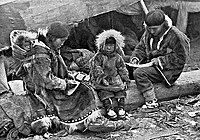
Photo from wikipedia
Most parents want their children to succeed well. For some parents, however, children’s successes are strongly related to beliefs about their own self-worth; a concept known as parental child-invested contingent… Click to show full abstract
Most parents want their children to succeed well. For some parents, however, children’s successes are strongly related to beliefs about their own self-worth; a concept known as parental child-invested contingent self-esteem, which has shown links to negative parenting practices (e.g., psychological control). Less is known about associations with aspects of the parent–child relationship that are particularly relevant among families with immigrant backgrounds. We examine the associations with acculturation-related conflicts in a sample of 180 Latino parents of children in 6th to 12th grade. Results showed that higher levels of parental child-invested contingent self-esteem was significantly linked to higher levels of acculturation conflicts, but this link was especially strong if the parent reported that their child was unresponsive to their corrections. When parents base their self-worth on their child’s successes and the child acts in ways that are not in line with parents’ expectations, parents report more acculturation-related conflicts.
Journal Title: Journal of Family Issues
Year Published: 2021
Link to full text (if available)
Share on Social Media: Sign Up to like & get
recommendations!